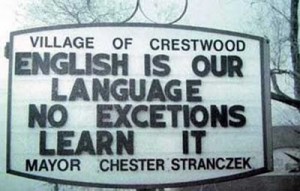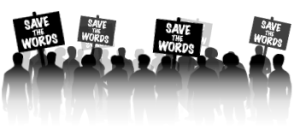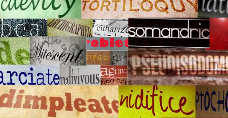Last month, my blogmate Jim Bell posted a blog called The First Line Game, a cool exercise he and some friends do to have fun with the first lines of their WIP. We’ve often discussed the power (or lack of) that first lines have on the reader. It can’t be emphasized enough how much a first line plays into the scope of the book. For just like first impressions, there is only one shot at a first line. It can set the voice, tone, mood, and overall feel of what’s to come. It can turn you on or put you off—grab you by the throat or shove you away. It’s the fuse that lights the cannon.
Some first lines are short and to the point—built to create the most impact from a quick jab. Others seem to go on and on and on. And only when we arrive at the period at the end do we see how expertly crafted it was for maximum effect.
So in the spirit of sharing what I consider examples of pure genius, true literary craftsmanship, and genuine artistic excellence, I’d like to share what I think are some of the best first lines in literary history. Let’s start with two of the most famous:
It was a dark and stormy night; the rain fell in torrents, except at occasional intervals, when it was checked by a violent gust of wind which swept up the streets (for it is in London that our scene lies), rattling along the house-tops, and fiercely agitating the scanty flame of the lamps that struggled against the darkness. —Edward George Bulwer-Lytton, Paul Clifford (1830)
It was the best of times, it was the worst of times, it was the age of wisdom, it was the age of foolishness, it was the epoch of belief, it was the epoch of incredulity, it was the season of Light, it was the season of Darkness, it was the spring of hope, it was the winter of despair. —Charles Dickens, A Tale of Two Cities (1859)
Lolita, light of my life, fire of my loins. —Vladimir Nabokov, Lolita (1955)
I am an invisible man. —Ralph Ellison, Invisible Man (1952)
The sun shone, having no alternative, on the nothing new. —Samuel Beckett, Murphy (1938)
This is the saddest story I have ever heard. —Ford Madox Ford, The Good Soldier (1915)
It was a wrong number that started it, the telephone ringing three times in the dead of night, and the voice on the other end asking for someone he was not. —Paul Auster, City of Glass (1985)
The sky above the port was the color of television, tuned to a dead channel. —William Gibson, Neuromancer (1984)
All this happened, more or less. —Kurt Vonnegut, Slaughterhouse-Five (1969)
If you really want to hear about it, the first thing you’ll probably want to know is where I was born, and what my lousy childhood was like, and how my parents were occupied and all before they had me, and all that David Copperfield kind of crap, but I don’t feel like going into it, if you want to know the truth. —J. D. Salinger, The Catcher in the Rye (1951)
Through the fence, between the curling flower spaces, I could see them hitting. —William Faulkner, The Sound and the Fury (1929)
Ships at a distance have every man’s wish on board. —Zora Neale Hurston, Their Eyes Were Watching God (1937)
He was an old man who fished alone in a skiff in the Gulf Stream and he had gone eighty-four days now without taking a fish. —Ernest Hemingway, The Old Man and the Sea (1952)
It was the day my grandmother exploded. —Iain M. Banks, The Crow Road (1992)
It was a pleasure to burn. —Ray Bradbury, Fahrenheit 451 (1953)
It was love at first sight. —Joseph Heller, Catch-22 (1961)
Once upon a time, there was a woman who discovered she had turned into the wrong person. —Anne Tyler, Back When We Were Grownups (2001)
We started dying before the snow, and like the snow, we continued to fall. —Louise Erdrich, Tracks (1988)
Every summer Lin Kong returned to Goose Village to divorce his wife, Shuyu. —Ha Jin, Waiting (1999)
In my younger and more vulnerable years my father gave me some advice that I’ve been turning over in my mind ever since. —F. Scott Fitzgerald, The Great Gatsby (1925)
"To be born again," sang Gibreel Farishta tumbling from the heavens, "first you have to die." —Salman Rushdie, The Satanic Verses (1988)
The seller of lightning rods arrived just ahead of the storm. —Ray Bradbury, Something Wicked This Way Comes (1962)
Granted: I am an inmate of a mental hospital; my keeper is watching me, he never lets me out of his sight; there’s a peephole in the door, and my keeper’s eye is the shade of brown that can never see through a blue-eyed type like me. —GŸnter Grass, The Tin Drum (1959; trans. Ralph Manheim)
In the late summer of that year we lived in a house in a village that looked across the river and the plain to the mountains. —Ernest Hemingway, A Farewell to Arms (1929)
He was an inch, perhaps two, under six feet, powerfully built, and he advanced straight at you with a slight stoop of the shoulders, head forward, and a fixed from-under stare which made you think of a charging bull. —Joseph Conrad, Lord Jim (1900)
The past is a foreign country; they do things differently there. —L. P. Hartley, The Go-Between (1953)
I write this sitting in the kitchen sink. —Dodie Smith, I Capture the Castle (1948)
Of all the things that drive men to sea, the most common disaster, I’ve come to learn, is women. —Charles Johnson, Middle Passage (1990)
In the town, there were two mutes and they were always together. —Carson McCullers, The Heart is a Lonely Hunter (1940)
High, high above the North Pole, on the first day of 1969, two professors of English Literature approached each other at a combined velocity of 1200 miles per hour. —David Lodge, Changing Places (1975)
The cold passed reluctantly from the earth, and the retiring fogs revealed an army stretched out on the hills, resting. —Stephen Crane, The Red Badge of Courage (1895)
Let’s finish with my personal all-time favorite:
It was a bright cold day in April, and the clocks were striking thirteen. —George Orwell, 1984 (1949)
So which ones have I missed? If it’s not on this list, what’s your favorite first line?
————————————
THE PHOENIX APOSTLES, coming June 2011
"A knockout apocalyptic thriller." – Douglas Preston






